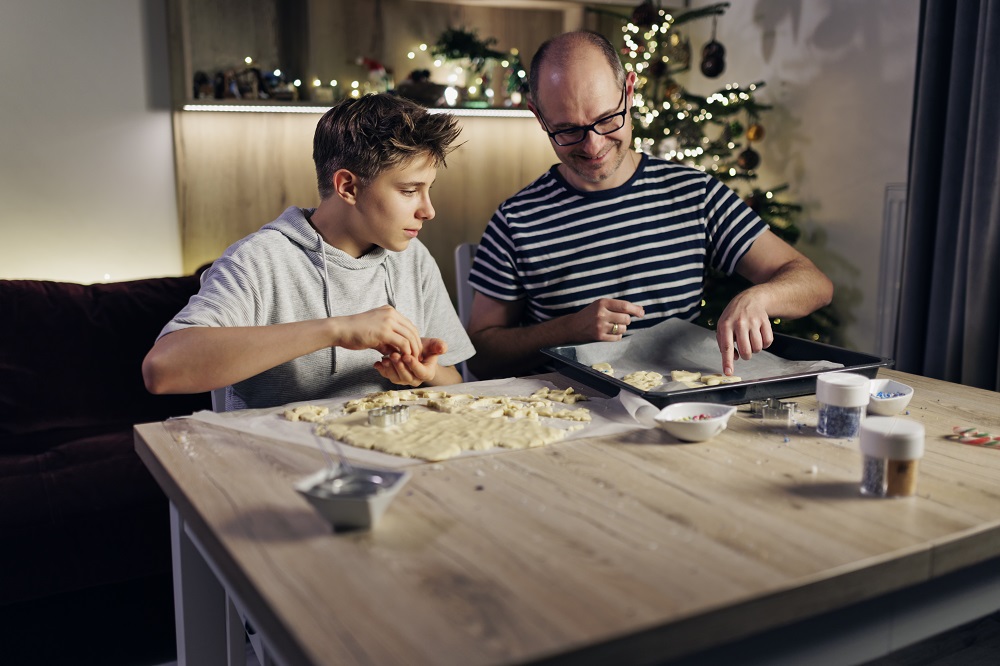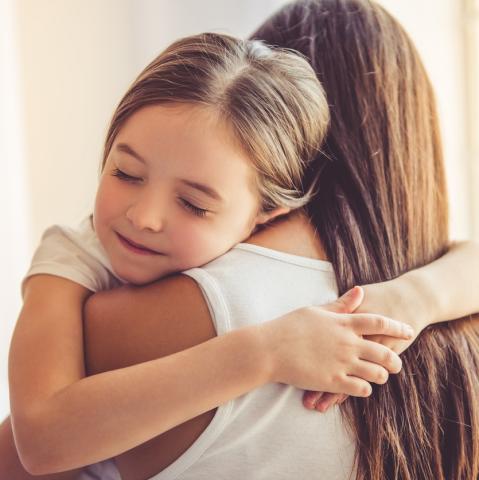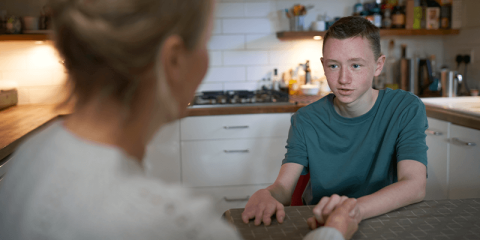Let’s face it, what with short days, gloomy weather and money tighter than ever, this time of year can be a bit dismal. But it doesn’t have to be. There are lots of simple things you can to boost everyone’s wellbeing over winter.
Often parents find that looking after themselves is the last thing on their list – the most important thing is the children, right? But you can’t pour from an empty glass, and if you’re feeling tired and low, it’s hard to be strong and supportive for anyone else. So don’t think of carving out a bit of “me time” as a selfish thing to do – it’s an important part of caring for your kids.
Things to do at home to look after yourself
Tip #1: Try some relaxation exercises

If you’re feeling tense, spending a few minutes a day doing some relaxation exercises may help. NHS Inform have some suggestions, including breathing techniques and videos and playlists to help you relax. Relaxing and being mindful can help you focus on the present, rather than dwelling on the past or worrying about the future.
Tip #2: Cosy cooking
When it's cold outside, it's tempting to ditch healthy habits and reach for the comfort food. But why not enjoy the best of both worlds by cooking up an easy, healthy stew you can make using just one pan or pot, like this sweet potato stew? Or how about trying a hearty soup, like Cullen skink or Scotch broth?
Tip #3: Do something you love
Remember that time before you had kids, when you could do things like read, play music, go the gym, spend time with your partner or even just watch a TV programme that isn’t aimed at 4 year olds? Try and carve out a bit of time each week to rekindle those lost interests and do something you love. Not only will concentrating on something different help you de-stress, but pursuing an interest can also help raise your self-esteem.
Tip #4: Grow a house plant
You might think having yet another thing to look after won’t bring you much joy, but inviting a bit of nature indoors can really lift the spirits. You can buy houseplants in local stores or the supermarket, but have you ever thought about growing one from seed? This article from the BBC explains how to grow plants from seeds you can find in your kitchen cupboards.
Tip #5: Keep in touch
If you’re feeling a bit low, there’s nothing like a good blether with a friend to lift the spirits. Try to find a quiet moment for a phone call or video chat – if you can’t get any peace at home, how about sitting in the park to make a call? That way you’ll get the double benefit of fresh air too!
Tip #6: Turn up the bass
If you’re a music fan, tuning into some songs you love or that remind you of fun times can really help cheer you up. So next time you’re out walking – or maybe just cleaning the house – stick on some banging tunes that make you smile and sing along. You could also talk to the kids about the music they like, and share some favourite tunes – who knows, maybe you’ll discover something new you love!
Tip #7: Get a good night's sleep
A good night’s sleep can make all the difference to your mood. If you struggle to fall asleep, or stay asleep, here are some more tips you could try:
- Be as active as you can during the day – see our ‘keeping active’ tips below for some ideas.
- Keep your bedroom a device-free zone and try not to look at any screens for an hour or two before you go to bed. Leave your phone outside the room so you can’t be tempted to check it one last time before you go to sleep. If you use your phone as an alarm to wake you up in the morning, you could try getting an old fashioned alarm clock instead.
- If noise or light are stopping you from sleeping, try ear plugs or an eye mask.
- Avoid caffeine and sugary foods late in the day – these can keep us awake. Try making yourself a hot milky drink instead.
- Try some relaxation techniques – NHS Inform has some suggestions.
You can find more tips and advice on what to do if poor sleep is a problem for you at the Mental Health Foundation and NHS Inform websites. If the main thing keeping you up is the kids, our pages on sleeping have more advice on settling them.
Tips for keeping active
Tip #1: Go for a walk

Did you know that going for a walk isn’t only good for your physical health but is great for mental health too? Just half an hour outside in natural light will help you feel better, and sleep better too. Not convinced? The Paths for All website has lots of tips to help you get your walking shoes on and get outdoors.
Tip #2: Take up jogging or running
Playing outdoors with the kids is a great way to raise the spirits, but if you’d rather have a bit of ‘me time’ to clear your head, how about giving jogging or running a go? If you’re new to running, the NHS Couch to 5k app is a great place to start. Or you could try Jog Scotland's Learn to Run guide, which aims to get you running for 15 minutes in 10 weeks.
Tip #3: On your bike
If running isn’t for you, how about cycling? Cycling is great for keeping your body and mind healthy, and can give you the freedom to visit new places in your local area. It’s also much better for the planet than travelling by car. If you want to test the waters before committing yourself, you could try hiring a bike or using a bike sharing scheme like nextbike. Cycling Scotland has lots of advice if you’re thinking of taking up cycling on your own or as a family.
Tip #4: Exercise indoors
If it really is too miserable to go outside, you can always bust out those legwarmers and get some exercise indoors. The NHS Fitness studio has videos you can try, and of course YouTube is bursting at the seams with fitness experts taking you through your paces. And there are lots of ways you can exercise together indoors as a family – take a look at our page on keeping active indoors for some ideas.
Tips to boost the kids' wellbeing
It’s not just adults who can feel low at this time of year – children can get pretty grumpy too! Here are some ideas for boosting their mood. You can find more tips for supporting your kids’ mental health here. If they’re acting up or being difficult, we’ve got lots of tips for coping here.
Tip #1: Get outside
Even if the weather’s doing its worst, getting outside is great for clearing the head and raising the spirits. From a walk to the play park or a trip to feed the ducks to a game of tig or a kick about with a ball, a breath of fresh air will blow away the cobwebs for everyone. We’ve got lots more ideas for ways to keep the whole family active outdoors here.
Tip #2: Do something creative
Getting messy with crayons, paint, glue or biodegradable glitter isn’t just fun – it also helps kids develop self-confidence, express their feelings and improve their focus – who knew? For a triple win, how about collecting some natural materials like pine cones, leaves or sticks to make a nature collage? This gets the kids outdoors, saves on the cost of craft materials and encourages them to think creatively, all at once! We’ve got lots more suggestions of creative things for toddlers, children and teens to do here.
Tip #3: "Coorie in"
“Coorie” is a Scots word that means to snuggle or cuddle. “Coorie-ing in” is all about getting comfy and cosy – so why not give it a go with the kids? How about building a cosy den from cushions and blankets, then settling down with some of their favourite books and a few healthy snacks for a peaceful afternoon of reading and snuggles?
Tip #4: Dance magic
If everyone’s feeling a bit fed up and sluggish, putting on some of your favourite music and dancing round the kitchen or living room will lift everyone’s spirits. Don’t be self-conscious – bust out those mum/dad dance moves and get the kids to follow you. Or you could try copying their moves – it doesn’t matter what you do, as long as you keep moving!
Tip #5: Warm hugs
If anyone in the family is feeling down, a nice big hug can make all the difference. But don’t make it a quick hug – hang in there for a count of 10 to really feel the benefit. Don’t believe us – try it and see!
Tip #6: Practise gratitude
You may be rolling your eyes right now, but thinking about things you’re grateful for can really help lift everyone’s mood. At the end of the day, try asking the kids to think about three things that have gone well or that they’re grateful for. Even if those three things are always the hamster, pizza and Netflix!
Tips for older children and teens
If your children are older, our section on supporting your teen's mental health has lots of advice. You could also suggest they have a look at Young Scot’s Aye Feel website. It has lots of useful ideas and advice for young people on looking after their mental health and getting support.
Help and support
Be kind to yourself: feeling low or unhappy is nothing to be embarrassed about. So don’t feel as if you have to “pull yourself together” or “soldier on”. Instead, talk to someone you trust about how you feel. This could be your partner, a friend or your GP. Or you may find it easier to call a helpline – here are some organisations that can help:
- Samaritans provide confidential non-judgemental emotional support, 24 hours a day, for people who are experiencing feelings of distress or despair. You can contact Samaritans free on 116 123. You can also find more information about Samaritans on their website.
- Breathing Space offers free and confidential advice for people experiencing low mood, depression or anxiety, whatever the cause. They can be contacted on 0800 83 85 87, 6pm to 2am Monday to Thursday; and 6pm Friday through the weekend to 6am Monday. Calls to Breathing Space are free from landlines and from mobile networks. The Breathing Space website provides a wide range of useful information and advice about coping with low mood, depression and anxiety.
- NHS Living Life is another source of support that’s available out of hours. It’s a free telephone service available to anyone over the age of 16 feeling low, anxious or depressed. The service can be accessed either by a referral through your GP, or by phoning the number directly on 0800 328 9655 (Monday to Friday 1pm – 9pm). You can find out more about Living Life via the Breathing Space website.
- NHS Inform offers a self-help guide on anxiety you may find useful.
You can also find mental health advice for parents, new mums and parents to be here on Parent Club.
 Activities & Play
Activities & Play Behaviour
Behaviour Childcare
Childcare Development & Growing Up
Development & Growing Up Family, Friends & Relationships
Family, Friends & Relationships Feeding Your Baby
Feeding Your Baby Food & Eating
Food & Eating Health & Safety
Health & Safety Mental Health & Wellbeing
Mental Health & Wellbeing Money & Work
Money & Work Online Behaviour & Safety
Online Behaviour & Safety Pregnancy & First Days
Pregnancy & First Days School & Education
School & Education Sleep
Sleep












 Behaviour
Behaviour
 Sleep
Sleep